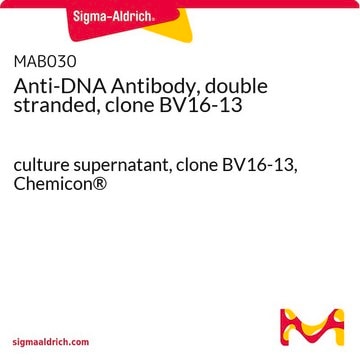04-1540
Anti-PICH Antibody, clone 142-26-3
clone 142-26-3, from mouse
Sinónimos:
excision repair cross-complementing rodent repair deficiency, complementation group 6-like, excision repair cross-complementing rodent repair deficiency complementation group 6 - like, Tumor antigen BJ-HCC-15, PLK1-interacting checkpoint helicase, ATP-de
About This Item
Productos recomendados
biological source
mouse
Quality Level
antibody form
purified immunoglobulin
antibody product type
primary antibodies
clone
142-26-3, monoclonal
species reactivity
human
technique(s)
immunocytochemistry: suitable
immunoprecipitation (IP): suitable
western blot: suitable
isotype
IgG1κ
NCBI accession no.
UniProt accession no.
shipped in
wet ice
target post-translational modification
unmodified
Gene Information
human ... ERCC6L(54821)
General description
Specificity
Immunogen
Application
Immunocytochemistry Analysis: A representative lot was used by an independent laboratory in IC.
Epigenetics & Nuclear Function
Cell Cycle, DNA Replication & Repair
Quality
Western Blot Analysis: 0.1 µg/mL of this antibody detected Plk1-interacting checkpoint helicase on 10 µg of HeLa-S3 cell lysate.
Target description
Physical form
Storage and Stability
Analysis Note
HeLa-S3 cell lysate
Other Notes
Disclaimer
¿No encuentra el producto adecuado?
Pruebe nuestro Herramienta de selección de productos.
Storage Class
12 - Non Combustible Liquids
wgk_germany
WGK 1
flash_point_f
Not applicable
flash_point_c
Not applicable
Certificados de análisis (COA)
Busque Certificados de análisis (COA) introduciendo el número de lote del producto. Los números de lote se encuentran en la etiqueta del producto después de las palabras «Lot» o «Batch»
¿Ya tiene este producto?
Encuentre la documentación para los productos que ha comprado recientemente en la Biblioteca de documentos.
Nuestro equipo de científicos tiene experiencia en todas las áreas de investigación: Ciencias de la vida, Ciencia de los materiales, Síntesis química, Cromatografía, Analítica y muchas otras.
Póngase en contacto con el Servicio técnico








